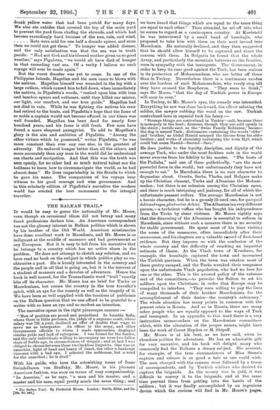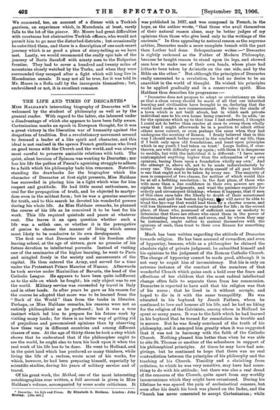THE BALKAN TRAIL.*
IT would be easy to guess the nationality of Mr. Moore, even though an occasional idiom did not betray and many frank professions declare him. An American correspondent has not the gloomy interest in Balkan politics which is shown by his brother of the Old World. American missionaries
have done excellent work in Macedonia, and Mr. Moore is as indignant at the muddle of massacre and bad government as any European. But it is easy to tell from his narrative that he belongs to a country which has no active share in the problem. He does not attempt to sketch any solution, and we have read no book on the subject in which politics play so un- obtrusive a part. He is keenly interested in the country and the people and in all that is going on, but it is the interest of a student of manners and a devotee of adventure. Hence the book is well named, for the Transatlantic word "trail "exactly hits off its character. Mr. Moore has no brief for Turks or Macedonians, but roams the country in the true traveller's spirit, with an eye for the comedy as well as the tragedy of it. We have been so well supplied with the treatises of publicists on the Balkan question that we can afford to be grateful to a writer with so keen an eye and so modest an intention.
The narrative opens in the right picaresque manner :—
" Men of position are proud and prejudiced. In humble Sofia, where there is little pretence, the judge of a supreme court, whose salary was 721. a year, declined an offer of double that wage to serve me as interpreter. An officer in the army, and other Government officials to whom I made approaches, displayed similar pride and lack of enterprise. I was bound for the border, and the only individuals willing to accompany me were two fallen stars of feeble age, in circumstances of despair; and at last I was obliged to choose between these two luckless linguists. One was an anarchist, light of head and heavy of heart, the other a bankrupt viscount with a bad eye. I selected the nobleman, but a word for the anarchist ; he is dead."
With his guide, who bore the astonishing name of Isaac Swindelbaum von Stuffsky, Mr. Moore, in his pleasant American fashion, was soon on terms of easy companionship. "In America," as he says, "a man and his master, and a master and his man, equal pretty much the same thing ; and
• The Balkan Trail. By Frederick Moore. London : Smith, Elder, and Co. (10e, 6d. net)
we have heard that things which are equal to the same thing are equal to each other." Thus attended, he set off into what he seems to regard as a comic-opera country. At Kustendil he was interviewed by a small band of komitajis, who proposed to take him with them on their next inroad into Macedonia. He naturally declined, and they then suggested that he should allow himself to be captured and share the
ransom with them. In Bulgaria he found that the whole Army, and particularly the mountain batteries on the frontier, were in sympathy with the insurgents. The Government, in
order to keep its case good against the Turk, has been zealous in its protection of Mohammedans, who are better off there than in Turkey. Nevertheless there is a continuous exodus over the borders of such Mohammedans, who rarely stop till they have crossed the Bosphorus. "They seem to think," says Mr. Moore, "that the day of Turkish power in Europe will soon be over."
In Turkey, to Mr. Moore's eyes, the comedy was intensified. Everything he saw was done backward, the officer saluting the
soldier, the sawyer rubbing the wood on the saw. Turkish contraband laws in especial took his fancy:—
" Strange things are contraband in Turkey—salt, because there is monopoly in the land ; firearms, though they are sold openly in the street ; novels such as the Swiss Family Robinson,' because the dog is named Turk ; dictionaries containing the words 'elder' and brother,' as Abdul Hamid usurped the throne from his elder brother ; and works of chemistry containing the term H20, which could but mean Hamid—Second—Zero."
He does justice to the loyalty, discipline, and dignity of the average Turk, who under the most feckless rule in the world never swerves from his fidelity to his master. "The hosts of
the Padisha," said one of them pathetically, "are the most powerful force in the world; but unfortunately they have not
enough to eat." In Macedonia there is no race character to dogmatise about. Greeks, Serbs, Vlachs, and Bulgars make up the Christian element, Turks and Albanians the Moham- medan; but there is no cohesion among the Christian races, and there is much intriguing and jealousy, for all of which the unfortunate peasant suffers. The average Macedonian is not
a heroic character, but he is a grossly ill-used one, for quicquid delirantreges,plectuntur Achivi. The Albanian is every different person,—a turbulent ruffian who has bought his independence from the Turks by sheer violence. Mr. Moore rightly says
that the disarming of the Albanians is essential to reform in Macedonia, since without such a measure there is no security for stable government. He spent most of his time visiting the scene of the massacres, often immediately after their occurrence, and his chapters are a valuable record of first-hand evidence. But they impress us with the confusion of the whole country and the difficulty of reaching an impartial estimate of blame. At the Vlach town of Krushevo, for example, the komitajis captured the town and massacred the Turkish garrison. When the town was retaken most of these gentry escaped, and the Turks wreaked their vengeance upon the unfortunate Vlach population, who had no love for one or the other. This is the avowed policy of the extreme sect of the committees,—to provoke the Sultan to set his soldiers upon the Christians, in order that Europe may be compelled to interfere. "They were willing to pay the lives of many thousands of their brother Macedonians for the accomplishment of their desire—the country's autonomy." The whole situation has many points in common with the present crisis in Russia. And as in Russia, there are many sober people who are equally opposed to the ways of Turk and insurgent. In an appendix to this work there is a very instructive memorandum on the Macedonian committees which, with the alteration of the proper names, might have been the work of Count Heyden or M. Shipoff.
Mr. Moore is at his best, as we have said, when lie abandons politics for adventure. He has an admirable gift for racy narrative, and his book will delight many who commonly find the Balkans a dreary subject. His account, for example, of the true circumstances of Miss Stone's capture and release is as good a tale as one could wish. The men charged with the ransom were followed by a troop of correspondents, and by Turkish soldiers who desired to capture the brigands. As the money was in gold, it was difficult to convey it to the brigands, and at the same
time prevent them from getting into the hands of the soldiers ; but it was finally accomplished by an ingenious device which the curious will find in Mr. Moore's pages. We commend, too, an account of a dinner with a Turkish garrison, an experience which, in Macedonia at least, rarely falls to the lot of the giaour. Mr. Moore had great difficulties with courteous but obstructive Turkish officers, who would not permit him to go near the disturbed districts ; but occasionally he outwitted them, and there is a description of one such secret journey which is as good a piece of story-telling as we have met. Lastly, we would recommend the really epic tale of the journey of Boris Sarafoff with ninety men to the Bulgarian frontier. They had to cover a hundred and twenty miles of mountains closely watched by the Turks, and when they were surrounded they escaped after a fight which will long live in Macedonian annals. It may not all be true, for it was told to Mr. Moore in a Sofia cafe by the insurgents themselves ; but, embroidered or not, it is excellent romance.







































 Previous page
Previous page